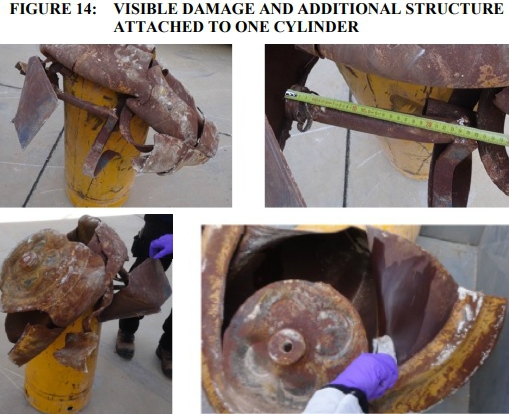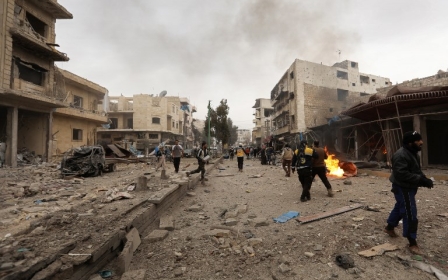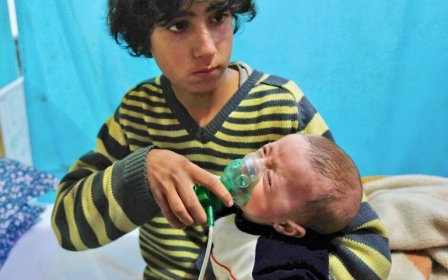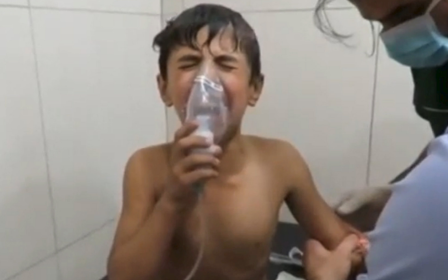Chlorine probably used in attack on Syria's Saraqeb, says watchdog
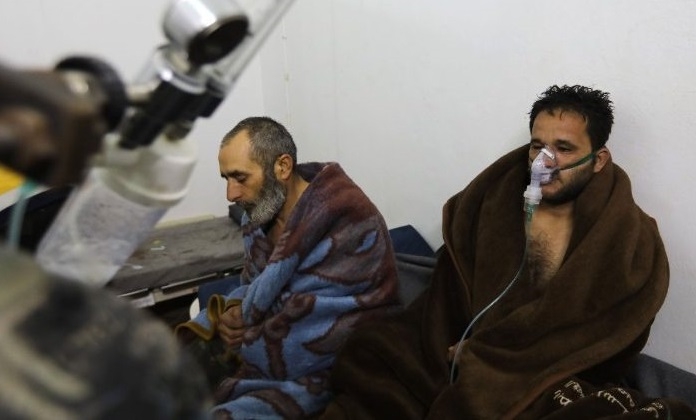
Chlorine gas was probably used in an attack in February in Saraqeb in the northwestern Syrian province of Idlib, the global chemical weapons agency said on Wednesday.
The Organisation for the Prohibition of Chemical Weapons did not say which side used the banned munitions, but that laboratory tests confirmed the presence of chlorine.
Its 34-page fact-finding mission report included evidence from locals that the munitions used in Saraqib were barrel bombs dropped by helicopter - a common delivery method of Syrian government forces.
The investigation focused on a 4 February attack on the town. Two bombs were dropped which, according to reports at the time, poisoned up to nine people.
The OPCW said its fact-finding mission determined chlorine was "released from cylinders by mechanical impact" in the town's al-Talil district - and referred to them in common terms as "barrel bombs" - and that evidence from witnesses, examination of the cylinders, and environmental samples had led it to its conclusions.
"At approximately 9pm, eight men were taking shelter in a basement in al-Talil when they heard... a helicopter had entered the airspace. At approximately 9.15pm, witnesses reported hearing a helicopter flying above the city and the sound of two 'barrels' falling and impacting in close proximity to their location. They also indicated not hearing any explosion," the report said.
Citing some of those who were sheltering in a basement, the report stated: "Since no explosion was heard, one occupant exited the basement a few minutes after impact. He returned to basement and reported an odour of chlorine. Shortly afterwards, he lost consciousness.
"The remaining occupants in the basement shelter reported a pungent odour and immediately developed shortness of breath, nausea, and a burning sensation in the eyes.
"Some of them reported losing consciousness. Witnesses described the odour as similar to household cleaning products, such as the local commercial brands 'Clor' and 'Flash', or bleach. They added that the odour was stronger than these products."
The report stated that staff at local hospitals reported that 11 patients brought in soon after the bombs fell "displayed nausea, eye irritation, and excessive secretions. They also presented with shortness of breath, coughing, wheezing..." but "the absence of any signs of external trauma".
The report noted that other chemicals were found "that can neither be explained as occurring naturally... nor as being related to chlorine" and that "some of the medical signs and symptoms reported were different to those expected from exposure to pure chlorine".
The OPCW said that there was "insufficient information and evidence to enable the FFM to draw any further conclusions on these chemicals at this stage".
"The team therefore relied on the testimony of interviewees, samples as made available by the interviewees, and limited hospital records... The mission was unable to visit hospitals."
Witnesses described the odour as similar to household cleaning products, such as the local commercial brands “Clor” and “Flash”, or bleach
- OPCW report
However, it stated that witnesses "gave a consistent narrative of the incident, the reported medical signs and symptoms" and it was satisfied by the way samples were collected.
The Syrian government denies using chlorine and other chemical weapons. The OPCW report stated that the government had told it Saraqeb had not been under its control for a long period of time, including the time of the incident. It supplied the OPCW with technical analysis of the alleged incident based on open-source media, but had not responded to further requests for supporting information.
The OPCW's director-general, Ahmet Uzumcu, said: “I strongly condemn the use of toxic chemicals as weapons by anyone, for any reason, and in any circumstances.
"Such acts contradict the unequivocal prohibition against chemical weapons enshrined in the Chemical Weapons Convention.”
New MEE newsletter: Jerusalem Dispatch
Sign up to get the latest insights and analysis on Israel-Palestine, alongside Turkey Unpacked and other MEE newsletters
Middle East Eye delivers independent and unrivalled coverage and analysis of the Middle East, North Africa and beyond. To learn more about republishing this content and the associated fees, please fill out this form. More about MEE can be found here.


